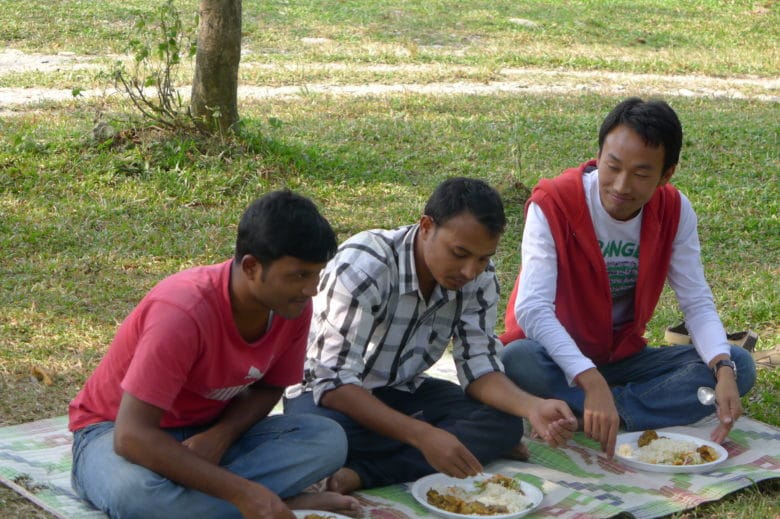You meet every week for worship, prayer, and study. Is your house church healthy? Under the surface, there seem to be tensions. Relationships don’t go very deep, and resentments mount between some members. A few people are close friends, others feel excluded. Some have stopped coming who initially seemed interested. You wonder why.
In previous blogs I wrote about the elements and activities of a church; things like worship, giving, baptism, Lord’s supper, etc. A healthy house church maintains a balance between its internal and external focus. The sense of community and fellowship within the church needs to consistently deepen.
Christmas Dilemma
We were in the first year of our church planting effort. There were a handful of new believers. It was December and the question came up in our team. How would we celebrate Christmas? Most of the believers and seekers were young men from a Hindu background. They’d never experienced Christmas before. We didn’t want to institute anything that was extra-biblical in nature.
Should we skip the whole thing? Or have a simple service, tell the story of Jesus’ birth, and call it good? We didn’t want to do something that would be a heavy baton. We definitely didn’t want to bring in American cultural symbols like Santa Claus, a Christmas tree and an obligation to give gifts.
As our team pondered and prayed, I considered the many festivals observed in the Bible. God had instituted these celebrations for His people. He had given specific instructions about them. He knew it was in the nature of humans to need special times of celebration.
The new believers in our group were coming out of Hinduism. Some Hindu festivals we could redeem. We could assign new meanings, strip away religious things and keep the cultural elements. Others festivals were harder to do this with. I knew we needed to fill the holes created socially when they had decided to stop idolatry. Their social need for celebration remained strong. How could that be filled?
We determined to do things in a way that was simple, reproducible, and culturally appropriate.
For our first Christmas, we decided on a picnic in the mountains. Everyone brought something. We cooked outside on an open fire. There was dancing, singing, and games planned by the new believers.
A visiting friend shared the story of Jesus’ birth, life, death, and resurrection. There were many who attended our “festival” who were not yet following Jesus. Our first Christmas was a great success! It built the health of our new community of faith. The celebration met both the internal needs of the believers as well as our external need to be a witness to others.
Healthy Churches Reproduce Healthy Churches
As discovery groups transition into churches, they must continue to grow – not only numerically, but as a community. A healthy church balances both the internal life of the church and the external vision for the lost. Healthy first-generation churches will multiply healthy daughter and grand-daughter churches.
Signs of a Healthy Church
1) Believers gather regularly – both formally and informally.
If the only time you meet one another is when you gather for your discovery or story group, friendships are not very deep. We can get into a habit of thinking of “church” as something we attend once a week. A healthy church is made up of people who meet one another often. This happens both in formal times of worship, prayer, and training, but also informally. How regularly do your church members get together? Do they enjoy gathering? Or is it more of a duty?
2) They serve one another in times of need.
In earlier blogs, I’ve written about giving. We work to develop a spirit of generosity within the churches we start. Giving must not be limited to a weekly offering! Do your church members help one another? Do they know what is happening in each other’s lives? When a need arises, is it natural for the church to come together to help? The New Testament church gave to one another, loved and served each other. Their love and care for each other was noticed by the community around them.
3) Open and transparent relationships of trust grow.
If your house church is made up of people who already were related to one another, they may already know each other. Many house churches grow through natural relationship links. Those relationships aren’t always healthy though. Encourage and model openness and vulnerability within the group.
4) Conflicts are resolved between members.
Inevitably, conflicts will arise within the church. Help the new believers work through their issues in a biblical way (Matt 18:15). Don’t allow offense and unforgiveness to creep in. Work hard to resolve conflicts between members quickly.
“They will know we are Christians…disciples…by the way we love one another.” (John 13:35)
3 Things to Invest In Doing Together
1) Outreach Plans
Shared goals bring people into closer relationships. What is God calling you to do together? As the new church decides together on outreach plans (or ways to bless their community), they will grow closer to one another.
2) Prayer
Special times of prayer can help the church draw closer as well. Many movements plan special prayer events. Days of fasting and prayer or all-night prayer for the churches can be very meaningful.
3) Celebration and Fun
As in the example about Christmas above, don’t neglect celebration. Especially as groups begin to multiply, it is very encouraging to have everyone come together. Once a month or every few months, organize a corporate celebration, a festival, or party. Later, as the life of the movement develops, there will also be other corporate celebrations. You will gather for weddings, funerals, etc. More than one house group will gather to serve and help one another.
Stronger Community
How will you develop the health and internal life of the churches you are starting? What can you do to encourage a strong church community? Share your ideas in the comments below or on the Disciple-Making Movements Facebook Group or Page.
Free Simple Coaching Manual

Want to learn how to be a DMM coach? How to train other coaches in your movement using simple skills? Get this free manual today!



